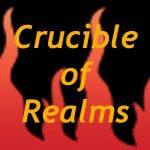The Grinder vs The Showboat in RPGs
Here’s a question that comes up from time to time when I’m playing role-playing games. Is it better for your character to have a mechanical advantage on its character sheet or to have a non-mechanical advantage gained through role-playing with NPCs and interacting with the plot?
I realize that with a question of that level of complexity the immediate reaction is probably, “Wha… huh?” So, let’s break this down and analyze it a bit. There are a couple of types of gamers that personify the extreme end of each option: the Grinder and the Showboat.
1: The Grinder
In the lingo of MMORPG players, a “grinder” is someone who goes out and kills things repeatedly just to get the experience necessary to level up. This term has mutated a little and drifted over to tabletop, where it refers to a player who’s only interested in gaining more and more of a mechanical and tactical advantage – and often does so by focusing solely on the hack and slash elements of the game.
 Grinders can be fun to play with if you’re not taking the game too seriously. Unfortunately, they can also kill the role playing element by encouraging the rest of the group to focus solely on the game’s tactical or mechanical aspects. Now, some groups are fine with this. If you have a group full of Grinders, then there isn’t really a problem.
Grinders can be fun to play with if you’re not taking the game too seriously. Unfortunately, they can also kill the role playing element by encouraging the rest of the group to focus solely on the game’s tactical or mechanical aspects. Now, some groups are fine with this. If you have a group full of Grinders, then there isn’t really a problem.
If the group is a bit more diverse, however, then having one or more Grinders can become more of an issue. If they just keep going on unchecked without considering the rest of the group, they can hog attention and make the game less fun for everyone else. Similarly, if the GM or other players crack down too hard on the Grinders in a group, then that means less fun for the Grinders, which isn’t good either.
So when I feel like grinding as a player I try to keep it reined in enough that it won’t stomp all over other players’ fun. When I’m running a game with a Grinder in it, I try to make sure that there’s enough action to satisfy him or her without it getting too ridiculous for the other players.
2: The Showboat
The term “showboat,” while originally referring to a paddle-wheel steam ship used as a traveling theatre, has also come to mean a person who likes to show off for the sake of attention. I’m sure anyone who’s played a lot of RPGs has run into their fair share of individuals who like to role-play their characters and are very good at talking. That’s all well and good and even encouraged in most games, but when they overdo it to the point that they’re showboating, it can become a problem. I will admit that as a former theatre student, this is a trap I’m a bit more prone to fall into.
 Like Grinders, Showboats can draw a lot of attention away from other players if they don’t watch themselves. Some will deliberately play their characters to the hilt with the express purpose of hijacking the game’s narrative. That means they can end up taking control of the plot to make their characters more important or to gain advantages that aren’t mechanical but effectively exempt a character from game mechanics the other players still have to deal with.
Like Grinders, Showboats can draw a lot of attention away from other players if they don’t watch themselves. Some will deliberately play their characters to the hilt with the express purpose of hijacking the game’s narrative. That means they can end up taking control of the plot to make their characters more important or to gain advantages that aren’t mechanical but effectively exempt a character from game mechanics the other players still have to deal with.
When I feel like I’m starting to show off too much I try to take it down a notch. These kinds of players can be tough to keep in line, but the important thing for a GM to remember is to keep paying attention to the other players as well as the Showboat.
Whether you’re dealing with mechanical rewards or story rewards, the key is moderation.
As a GM, I think it’s important to have a good balance of rewards in a game. Offering both mechanical and story rewards will encourage players to go for both. Keeping an eye on what aspects of the game each player enjoys and scaling the different elements of the game accordingly will go a long way towards keeping the players happy.
As a player, I think that having mechanical advantages on your character sheet is very helpful – after all, it’s much cooler when your character’s effective – but those advantages always need to line up with the concept you have for the character. That includes how you’re going to role-play him or her. Similarly, gaining power, influence or other story-based perks through role-playing is great, but not to the extent that you completely undermine the game’s mechanics.
So which kind of advantage is better? Neither. Or both. It really depends on your playing style, but in my opinion if you try to set a balance between the two, you’ll get a lot more out of the experience – without having to grind OR showboat.


 http://www.crucibleofrealms.com/
http://www.crucibleofrealms.com/ http://www.rpgdebate.com/
http://www.rpgdebate.com/ https://cyphercast.wordpress.com/
https://cyphercast.wordpress.com/ Abduction Etiquette
Abduction Etiquette Farrago on Amazon Kindle
Farrago on Amazon Kindle From the Dark Side on Amazon
From the Dark Side on Amazon Main Street Rag – Spring 2010
Main Street Rag – Spring 2010 Titanic Jocularity!
Titanic Jocularity!